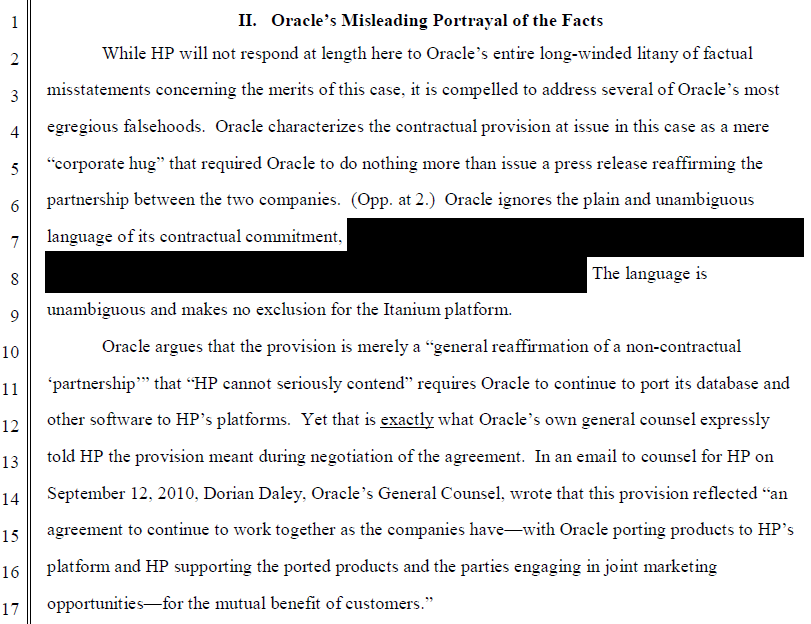HP, Oracle exchange court jabs in escalating Itanium support showdown

HP and Oracle are dueling in California Superior Court documents over the support of Itanium and whether the enterprise software giant is contractually obligated to support the processor.
In June, HP filed a civil lawsuit in the Superior Court of California in Santa Clara to force Oracle to support the Itanium platform. In March, Oracle said that it would stop supporting HP's Itanium platform because Intel planned to shut it down in the long run. HP and Intel both denied Oracle's claims.
HP argued that Oracle was trying to move Itanium customers to its hardware. Oracle said it was just telling the truth about Itanium. Now this dustup over Itanium---which can impact a bevy of enterprise customers---is careening to an Aug. 12 case management meeting with Judge James P. Kleinberg.
Last week, Oracle responded to HP's original complaint about the Itanium agreement between the two companies. HP's initial filing redacted items because of a confidentiality agreement in a separate lawsuit settled with Mark Hurd, former HP CEO and Oracle president.
In a filing, Oracle said that HP's lawsuit "is an abuse of the judicial process." Oracle reiterated that Itanium has no future and that it had the "temerity to tell customers the truth." Oracle then went on to say that HP's contract with Oracle for Itanium boils down to two sentences. Oracle said:
The core allegation in this case—which HP has aggressively sold to the press— is that HP has a contract with Oracle guaranteeing that Oracle will develop new versions of its flagship database product (and apparently everything else Oracle makes) to run on HP’s Itanium systems. Such an important contract, if it existed, would obviously be a heavily negotiated, fully documented formal contract, with terms and conditions and payment obligations and all the other characteristics of real-world commercial agreements. But there is no such agreement for porting the Oracle database to Itanium, which is why HP is advancing implied contract and promissory estoppel claims. And as for the written contract HP alleges, that is a mere two-sentence commitment Oracle made just nine months ago—not in the ordinary course of business but in the context of a lawsuit HP filed against its own former CEO, Mark Hurd—the substance of which the parties revealed in a press release announcing the end of that litigation: “HP and Oracle Corp. today reaffirmed their long-term strategic partnership and the resolution of litigation regarding Mark V. Hurd’s employment at Oracle.
Oracle's big beef is that HP is alleging that there's a contract, but then moved to seal the complaint because it quotes the Hurd settlement, which is confidential. Oracle continued:
This vintage McCarthyism is as unfair as it is hypocritical: HP proclaims “I have a contract” and then claims that confidentiality interests preclude it from showing anyone the alleged agreement. Yet the actual substance of the agreement has already been revealed: the parties said they agreed to make-up and had their photo-op together. HP is trying to use confidentiality to “protect” commitments that do not exist.
On Thursday, HP replied to Oracle's filing.
Oracle argues in its Opposition that by moving to file its complaint under seal HP is trying to suppress the truth about the basis for its claims against Oracle. Nothing could be further from the truth. There is not a single word in HP’s complaint that HP is not willing – indeed eager – to make public. As Oracle well knows, HP filed its complaint with references to the Settlement Agreement redacted because at the insistence of all the parties – Oracle, HP and Hurd – the agreement contains a provision that precludes the parties from disclosing the terms of the agreement for any purpose. HP was bound to honor the terms of the strict confidentiality provision and took the appropriate procedural steps to do so. Rather than acknowledging this, or making any attempt to address the confidentiality issue with HP’s counsel, Oracle took the opportunity to try to land a cheap shot, making false accusations of “McCarthyism” and inappropriately larding the record with misleading and inflammatory assertions about the merits of the case.
Now HP wants to remove the confidentiality for some of the settlement, but not all items regarding the Hurd agreement. This excerpt from the complaint highlights how redaction can be a problem.
At issue is a Itanium support deal that really has no specific term. HP argues that Oracle is guessing about Intel's support and hurting customers. Meanwhile, Intel said it is supporting Itanium. Oracle said HP's contract is basically a press release.
Oracle issued a response to HP's filing. Oracle said:
In a legal filing today, HP said it is more than willing to make its complaint against Oracle public. But HP is not willing to make public the settlement agreement upon which the complaint is based. Oracle is not interested in withholding anything from the public. The complaint and the settlement agreement should be fully disclosed immediately.
HP countered:
There are many aspects of the agreement that have no relevance to the lawsuit. The parties negotiated an agreement on confidentiality, and that agreement is being honored by HP. Oracle and Hurd certainly have not agreed to waive the confidentiality obligations that they negotiated under the agreement and that impose a significant restriction on HP.
In the end, HP Itanium and Oracle joint customers are in the middle of a quagmire should they want to upgrade software.
Related:
